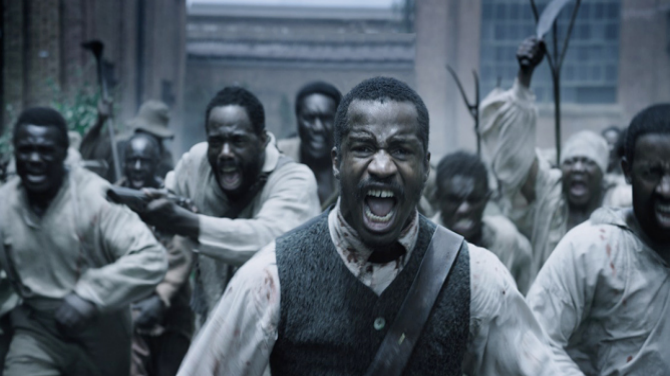[ad_1]

Director-actor-producer Nate Parker attends the premiere of The Birth of a Nation during the 2016 Sundance Film Festival at the Eccles Center Theatre in Park City, Utah, on Jan. 25, 2016.
Nicholas Hunt/Getty Images (image converted to black and white)
When the lights went up after a Sundance screening of Nate Parker’s film The Birth of a Nation, the bidding war began, leading to the steepest price ever paid for a film at the festival—$17.5 million—by Fox Searchlight.
The film’s reception was described as “electrifying.” Its title is no doubt intentionally provocative: Parker’s film shares its name with D.W. Griffith’s infamous 1915 movie that advocated white supremacy and celebrated the Ku Klux Klan, and Parker says that’s a good thing.
“D.W. Griffith, wherever his bones are as they backflip in the grave, he can forever be tethered to Nat Turner and the birth of this new nation of renaissance, of self-determination,” Parker said at a Blackhouse panel during the festival.
Parker’s film is about Nat Turner, who led a slave rebellion in Virginia in 1831, during which at least 55 whites were killed. The film’s writer, director, producer and star told The Root it’s all part of his plan to take back our narrative. “We didn’t want to denigrate the legacy of Nat Turner. We did not want to make an apologetic film. We didn’t want to sanitize the trajectory of Nat Turner and his movement,” Parker said.

Nate Parker in Birth of a Nation
Sundance Film Festival
At the film’s Sundance premiere, Parker got a prolonged standing ovation. It’s not an easy movie to watch because of the physical and mental brutality that slavery inflicted, and that’s how Parker wants it. “I made this film for one reason, with the hope of creating change agents. People can watch this film and be affected. They can watch this film and see that there are systems that were in place that were corrupt and corrupted people, and the legacy of that still lives with us,” Parker said during the Q&A. He told the audience that they need to look inside themselves and see if they are still carrying these systems that need to be changed.
It was a labor of love to get the film made. “Anything really worth having comes with a cost,” Parker told The Root. The actor put his career on hold after 2014’s Beyond the Lights, told his agent he would not work until he got The Birth of a Nation made and spent $100,000 of his own money doing just that. Parker, who said the film has been in the works for seven years, admits that people told him he was crazy.
“So many that at some point I said I’m not going to worry about the resistance and the defense … being forged against this dream and this goal,” said Parker. Eventually he got basketballers Tony Parker and Michael Finley to sign on as producers, along with several Hollywood heavyweights. In the end, the film cost just under $11 million to make.
The film stars several well-known black actors as slaves, including Gabrielle Union (Being Mary Jane), Aja Naomi King (How to Get Away With Murder), Aunjanue Ellis (The Help) and Colman Domingo (Selma). Union said that when she first got the script, she did not want to open it because she thought it was a remake of the original. “Understand that this is Hollywood, the things that cross your desk,” said Union.
But once she saw that the film was about Turner, “I begged,” she said. “This is the only story I have ever been interested in learning as a level of our history. It showcases our humanity and what happens when you try to strip that, and that there are consequences.” Union joked about how it’s a departure from the rom-com movies she often does, and her work in the film shows just how great a director Parker is.
The film was shot on a former slave plantation in Savannah, Ga., which many in the cast said was very emotional for them. Another sentiment they said they shared was the idea that African Americans need to reclaim their narrative. The film clearly shows Nat Turner as the complex man he was, fighting against an unjust system that tortured his people every moment of every day of their lives.
“I don’t apologize for Turner,” said Parker. “I had no aspirations of creating some shock-value piece; we’ve seen so much of that. For me it was about telling a story about human beings, black and white, trying to coexist in a corrupt system, trying to maintain their humanity in a system that was corroding their morality every moment, every second, of every day.”
Parker sees his film not only as a way to reclaim an important piece of African-American history but also as a way to hopefully change current thinking when it comes to racial injustice. “I want the audience to leave understanding it will take a riotous disposition to deal with the injustices of today,” said Parker, who cited the death of unarmed black men as one of those injustices.
It’s clear that where Turner picked up a deadly weapon to fight back in 1831, Parker and many others choose social tools as their weapons of choice. The Birth of a Nation will clearly be part of Parker’s lasting legacy. “I take great honor and responsibility in telling stories. The Bible says a good man leaves an inheritance for his children’s children. I just want my kids to know I made sacrifices on their behalf, and this film hopefully is a beginning to that.”
[ad_2]





















